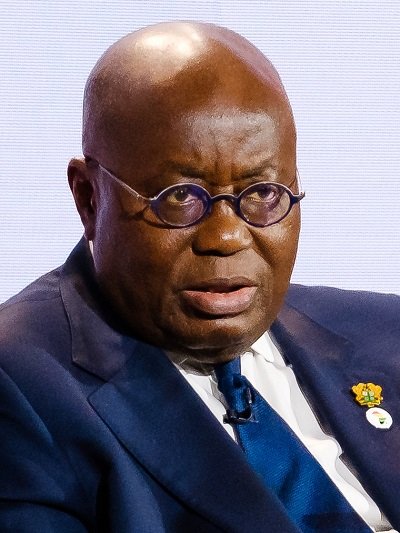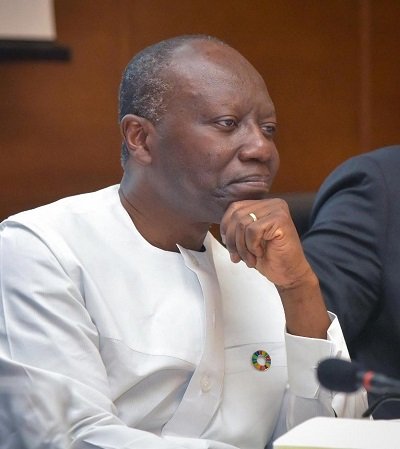Features
Ghana: ‘Mourning’ over return to IMF?

Ghana is speedily heading to the International Monetary Fund (IMF) for a fresh bailout, just after over three years, exiting the IMF programme.
Indeed, Ghanaians in recent months, have been feeling debilitating pinch of high inflation record and the impact of the Covid-19 pandemic and the Russia-Ukraine war, despite cuts in Government’s spending to avoid full blown debt crisis.

The Government of Ghana has issued an official statement signed by the Information Minister saying: “The President of the Republic, Nana Addo Dankwa Akufo-Addo, has authorised the Finance Minister, Ken Ofori-Atta to commence formal engagements with the International Monetary Fund, inviting the Fund to support an economic programme, put together by the Government of Ghana.
“This follows a telephone conversation between the President and the IMF Managing Director, Miss Kistalina Georgieva, conveying Ghana’s decision to engage with the Fund.
“At a meeting on June 30th, 2022, cabinet indicated its support for the decision.
“The engagement with the IMF will seek to provide balance of payment support as part of a broader effort to quicken Ghana’s build back, in the face of challenges induced by the Covid-19 pandemic and, recently, the Russia-Ukraine crises.”
Dr Albert Touna-Mama, IMF’s Ghana Country Representative, has confirmed that Ghanaian officials have contacted the Fund to request for assistance with the country’s own economic plan.
A tweet by Dr Touna-Mama says: “The IMF stands ready to support Ghana in restoring macro-economic stability, safeguarding debt sustainability and prompting inclusive and sustainable growth.”
The Government had previously stated emphatically, not to seek a bailout from the IMF again, especially when the country completed its last IMF programme in 2018, assuring that it has the capability of managing the nation’s economy efficiently.
Indeed, just a few weeks ago, the Finance Minister had re-stated the government’s aversion to suggestions for an IMF option in the face of the crippling difficulties confronting the Ghanaian economy, insisting that Ghana has the resources to prudently manage its economy.
For months, the government fought very hard to approve and implement a 1.5 per cent levy on electronic transactions.
Among many arguments, the government said the E-Levy was a direct substitute for a possible bailout from the IMF, in the face of the country’s growing economic challenges.
For instance, the New Juaben South Member of Parliament, Michael Okyere Baafi, in one of such arguments in defence of the Government said; “falling on the IMF for a bailout means, we cannot manage our own economy and that they should come to our rescue.”
“So, they will tell you that the first thing you have to do, is to cut your coat according to your size.
“And they will direct the Government to cancel the Free Senior High School programme, which is only a political decision and not an entrenched constitutional issue.”
Painfully, the government has eaten back its own words and since the announcement of its decision to “dance again” with the IMF, many Ghanaians have been “mourning” and expressing “hot” anger over the decision, contending that the IMF will be pushing “bitter pills” down the throats of Ghanaians in the name of a bailout.
Really, “mourning” is the outward expression of one’s grief. Grief is the internal feeling given to the experience of loss. Examples include fear, panic, pain, yearning, anxiety and emptiness.
Synonyms for “mourning” include wailing, weeping, sadness, despair, heartache, shiva and lamentation.
Some critics of government’s decision to return to the IMF say: “Election related expenditures, travel expenses and national cathedral expenses did not indicate that Ghana was really in distress.
“Rather, unexplained high borrowing beyond unsustainable levels, entangled the in-built resilience of the economy as interest payment burden, undermined fiscal prudence.
“While policy credibility and confidence have been compromised and mutilated.”
Others also argue that:”Though we have global economic challenges, not all countries are going to the IMF due to the pandemic and the Russia-Ukraine war.
“In terms of expenditures and funds related to Covid-19, Ghana experienced positive net benefits as the funds raised were more than the expenditures incurred.
“So, if the fresh and ongoing engagement with the IMF is pandemic induced, then it is mismanagement and corruption.
“Really, the intention of government to engage the IMF is to stabilise the economy and learn some basic lessons of prudence and productive expenditures, as statutory payments to many state institutions are even in several months arrears.”
Charles Robertson, global chief economist at the London-based Renaissance Capital, however, says:” It makes sense for Ghana to seek cheap IMF financing as bond markets were shut to the country.”
According to Robertson; “Ghanaian notes have been trading at distressed levels, amid concerns that the government will not be able to refinance foreign debts after the pandemic, and the Russia-Ukraine war sent borrowing costs soaring.”
Robertson says; “Ghana, just saying that they will begin talks with the IMF, will help open the door to them eventually, to access the international market.”
With Ghana having started engagement with the IMF for a very fresh bailout, the seeming “mournful” question on the lips of many is: “Why should we go back again to ‘dance’ with the IMF and suffer ‘broken limbs’?”
Alternatively, as a nation, what shall we do to avoid running to the IMF, again and again?
Contact email/ WhatsApp of author:
asmahfrankg@gmail.com (0505556179)
By G. Frank Asmah
Features
Traditional values an option for anti-corruption drive — (Part 1)
One of the issues we have been grappling with as a nation is corruption, and it has had such a devastating effect on our national development. I have been convinced that until morality becomes the foundation upon which our governance system is built, we can never go forward as a nation.
Our traditional practices, which have shaped our cultural beliefs, have always espoused values that have kept us along the straight and the narrow and have preserved our societies since ancient times.
These are values that frown on negative habits like stealing, cheating, greediness, selfishness, etc. Our grandparents have told us stories of societies where stealing was regarded as so shameful that offenders, when caught, have on a number of instances committed suicide.
In fact, my mother told me of a story where a man who was living in the same village as her mother (my grandmother), after having been caught stealing a neighbour’s cockerel, out of shame committed suicide on a mango tree. Those were the days that shameful acts were an abomination.
Tegare worship, a traditional spiritual worship during which the spirit possesses the Tegare Priest and begins to reveal secrets, was one of the means by which the society upheld African values in the days of my grandmother and the early childhood days of my mother.
Those were the days when the fear of being killed by Tegare prevented people from engaging in anti-social vices. These days, people sleeping with other people’s wives are not uncommon.
These wrongful behaviour was not countenanced at all by Tegare. One was likely going to lose his life on days that Tegare operates, and so unhealthy habits like coveting your neighbour’s wife was a taboo.
Stealing of other people’s farm produce, for instance, could mean certain death or incapacitation of the whole or part of the body in the full glare of everybody. People realised that there were consequences for wrongdoing, and this went a long way to motivate the society to adhere to right values.
Imagine a President being sworn into office and whoever administers the oath says, “Please say this after me: I, Mr. …., do solemnly swear by God, the spirits of my ancestors and the spirits ruling in Ghana, that should I engage in corrupt acts, may I and my family become crippled, may madness become entrenched in my family, may incurable sicknesses and diseases be my portion and that of my family, both immediate and extended.”
Can you imagine a situation where a few weeks afterwards the President goes to engage in corrupt acts and we hear of his sudden demise or incapacitation and confessing that he engaged in corrupt acts before passing or before the incapacitation—and the effect it will have on his successor? I believe we have to critically examine this option to curb corruption.
My grandmother gave me an eyewitness account of one such encounter where a woman died instantly after the Tegare Priest had revealed a wrong attitude she had displayed during the performance on one of the days scheduled for Tegare spirit manifestation.
According to her story, the Priest, after he had been possessed by the spirit, declared that for what the woman had done, he would not forgive her and that he would kill. Instantly, according to my grandmother, the lady fell down suddenly and she died—just like what happened to Ananias and his wife Sapphira in Acts Chapter 5.
NB: ‘CHANGE KOTOKA INTERNATIONAL AIRPORT TO KOFI BAAKO
By Laud Kissi-Mensah
Join our WhatsApp Channel now!
https://whatsapp.com/channel/0029VbBElzjInlqHhl1aTU27
Features
Emotional distortions:A lethal threat to mental health
Emotional distortions can indeed have a profound impact on an individual’s mental health and well-being. These distortions can lead to a range of negative consequences, including anxiety, depression, and impaired relationships.
Emotional surgery is a therapeutic approach that aims to address and heal emotional wounds, traumas, and blockages. This approach recognises that emotional pain can have a profound impact on an individual’s quality of life and seeks to provide a comprehensive and compassionate approach to healing.
How emotional surgery can help
Emotional surgery can help individuals:
Identify and challenge negative thought patterns: By becoming aware of emotional distortions, individuals can learn to challenge and reframe negative thoughts.
Develop greater emotional resilience: Emotional surgery can help individuals develop the skills and strategies needed to manage their emotions and respond to challenging situations.
Improve relationships: By addressing emotional wounds and promoting emotional well-being, individuals can develop more positive and healthy relationships with others.
The benefits of emotional surgery
The benefits of emotional surgery can include:
Improved mental health outcomes: Emotional surgery can help individuals reduce symptoms of anxiety and depression.
Enhanced relationships: Emotional surgery can help individuals develop more positive and healthy relationships with others.
Increased self-awareness: Emotional surgery can help individuals develop a deeper understanding of themselves and their emotions.
A path towards healing
Emotional surgery offers a promising approach to addressing emotional distortions and promoting emotional well-being. By acknowledging the impact of emotional pain and seeking to provide a comprehensive and compassionate approach to healing, individuals can take the first step towards recovery and improved mental health.
Join our WhatsApp Channel now!
https://whatsapp.com/channel/0029VbBElzjInlqHhl1aTU27
BY ROBERT EKOW GRIMMOND-THOMPSON






